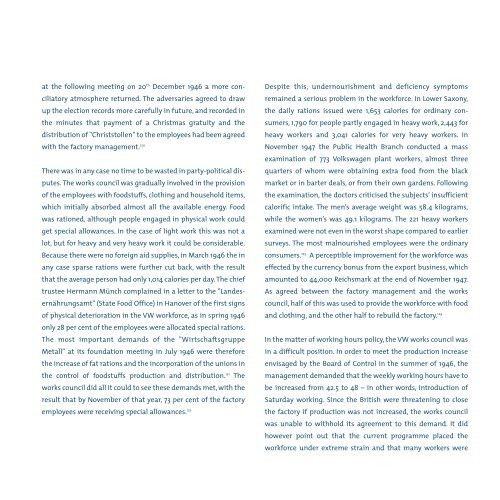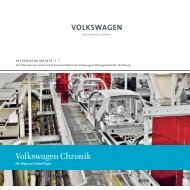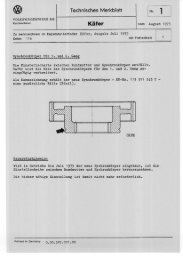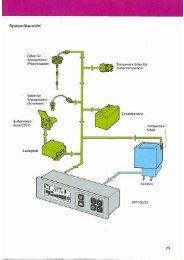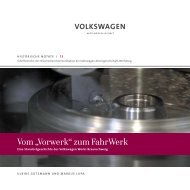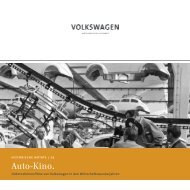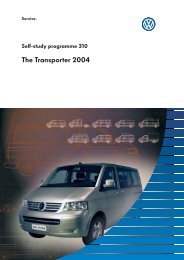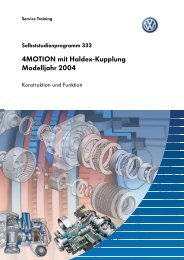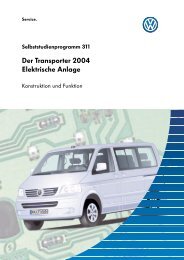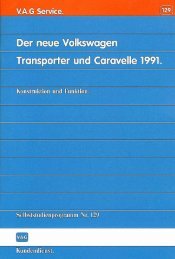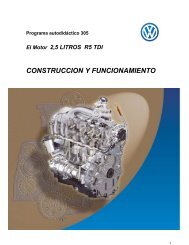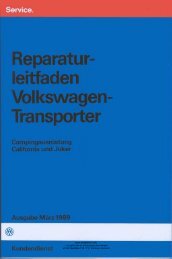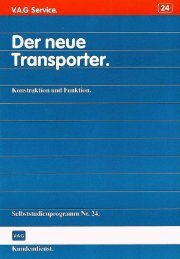HN 2: The British and their Works
HN 2: The British and their Works
HN 2: The British and their Works
Create successful ePaper yourself
Turn your PDF publications into a flip-book with our unique Google optimized e-Paper software.
at the following meeting on 20th December 1946 a more conciliatory<br />
atmosphere returned. <strong>The</strong> adversaries agreed to draw<br />
up the election records more carefully in future, <strong>and</strong> recorded in<br />
the minutes that payment of a Christmas gratuity <strong>and</strong> the<br />
distribution of "Christstollen" to the employees had been agreed<br />
with the factory management. 120<br />
<strong>The</strong>re was in any case no time to be wasted in party-political disputes.<br />
<strong>The</strong> works council was gradually involved in the provision<br />
of the employees with foodstuffs, clothing <strong>and</strong> household items,<br />
which initially absorbed almost all the available energy. Food<br />
was rationed, although people engaged in physical work could<br />
get special allowances. In the case of light work this was not a<br />
lot, but for heavy <strong>and</strong> very heavy work it could be considerable.<br />
Because there were no foreign aid supplies, in March 1946 the in<br />
any case sparse rations were further cut back, with the result<br />
that the average person had only 1,014 calories per day. <strong>The</strong> chief<br />
trustee Hermann Münch complained in a letter to the "L<strong>and</strong>esernährungsamt"<br />
(State Food Office) in Hanover of the first signs<br />
of physical deterioration in the VW workforce, as in spring 1946<br />
only 28 per cent of the employees were allocated special rations.<br />
<strong>The</strong> most important dem<strong>and</strong>s of the "Wirtschaftsgruppe<br />
Metall" at its foundation meeting in July 1946 were therefore<br />
the increase of fat rations <strong>and</strong> the incorporation of the unions in<br />
the control of foodstuffs production <strong>and</strong> distribution. 121 <strong>The</strong><br />
works council did all it could to see these dem<strong>and</strong>s met, with the<br />
result that by November of that year, 73 per cent of the factory<br />
employees were receiving special allowances. 122<br />
Despite this, undernourishment <strong>and</strong> deficiency symptoms<br />
remained a serious problem in the workforce. In Lower Saxony,<br />
the daily rations issued were 1,653 calories for ordinary consumers,<br />
1,790 for people partly engaged in heavy work, 2,443 for<br />
heavy workers <strong>and</strong> 3,041 calories for very heavy workers. In<br />
November 1947 the Public Health Branch conducted a mass<br />
examination of 773 Volkswagen plant workers, almost three<br />
quarters of whom were obtaining extra food from the black<br />
market or in barter deals, or from <strong>their</strong> own gardens. Following<br />
the examination, the doctors criticised the subjects’ insufficient<br />
calorific intake. <strong>The</strong> men’s average weight was 58.4 kilograms,<br />
while the women’s was 49.1 kilograms. <strong>The</strong> 221 heavy workers<br />
examined were not even in the worst shape compared to earlier<br />
surveys. <strong>The</strong> most malnourished employees were the ordinary<br />
consumers. 123 A perceptible improvement for the workforce was<br />
effected by the currency bonus from the export business, which<br />
amounted to 44,000 Reichsmark at the end of November 1947.<br />
As agreed between the factory management <strong>and</strong> the works<br />
council, half of this was used to provide the workforce with food<br />
<strong>and</strong> clothing, <strong>and</strong> the other half to rebuild the factory. 124<br />
In the matter of working hours policy, the VW works council was<br />
in a difficult position. In order to meet the production increase<br />
envisaged by the Board of Control in the summer of 1946, the<br />
management dem<strong>and</strong>ed that the weekly working hours have to<br />
be increased from 42.5 to 48 – in other words, introduction of<br />
Saturday working. Since the <strong>British</strong> were threatening to close<br />
the factory if production was not increased, the works council<br />
was unable to withhold its agreement to this dem<strong>and</strong>. It did<br />
however point out that the current programme placed the<br />
workforce under extreme strain <strong>and</strong> that many workers were


